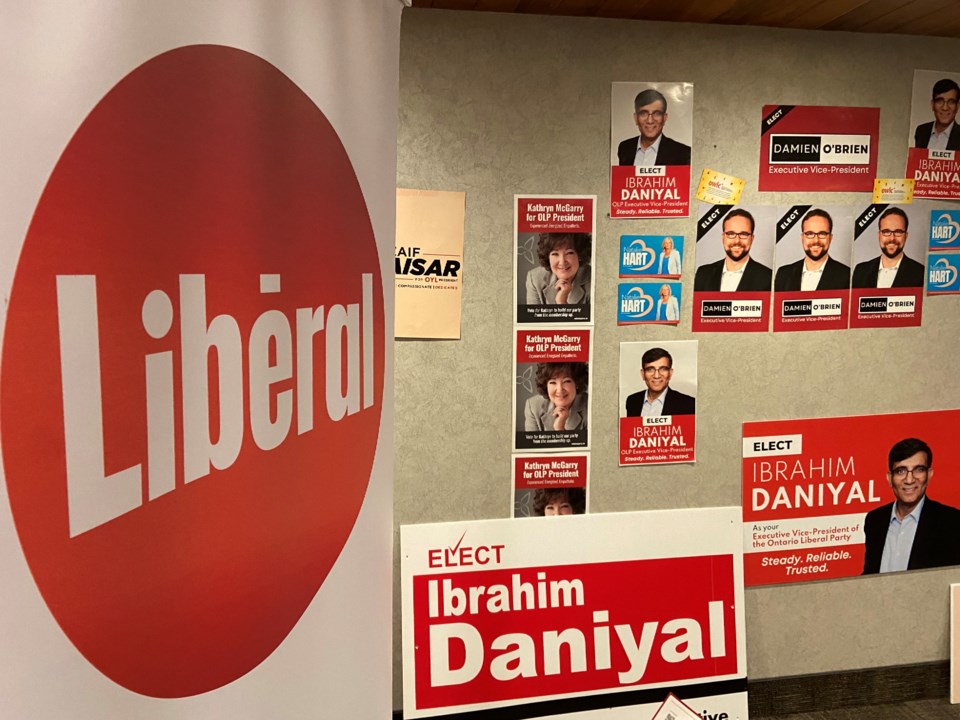EDITOR’S NOTE: This article originally appeared on The Trillium, a new Village Media website devoted exclusively to covering provincial politics at Queen’s Park.
Every Ontario Liberal member will be able to vote in the party's leadership election, thanks to a constitutional change made at its annual general meeting.
Liberal leaders have for decades been chosen at delegated conventions, where party delegates go through rounds of voting with each round's last-place finisher dropping off the ballot until one candidate receives a majority of votes.
Now, it'll be a more open process where every member gets to vote for the leader. Party delegates overwhelmingly voted in favour of the change.
"It matters because it represents change," said Liberal interim leader John Fraser after the vote. "It'll give us an opportunity to get out to every region of this province, to talk to people about what’s important to them. I think its going to be a great advantage in that regional campaign."
"It's an opportunity for us to renew, to rebuild, and to prepare for 2026," Liberal MPP and deputy leader Mitzie Hunter told The Trillium a couple of weeks ago while describing the one-member-one-vote proposal. Hunter was one of the main proponents of the change and helped lead the failed effort at the 2019 convention.
It is not a "true" one-member-one-vote system where every vote is counted equally. Instead, the Ontario Liberal Party (OLP) will now use a weighted system, which is common among Canadian political parties.
Each provincial riding will be allotted 100 points, no matter its number of members. The votes from the party's student clubs will each be worth 50 points, while its women's clubs' votes will be worth five points.
"That's the most democratic way to do things. We're a big province, and 100 people in Toronto is is different from 100 people in Nickel Belt, or Windsor—Tecumseh," Fraser said.
If a member belongs to both a riding association and one of the groups, they won't be able to vote twice. They have to choose to either vote in the riding association, or in the student group, for example.
Party delegates who gathered in Hamilton voted on Saturday to change to the weighted-one-member-one-vote system. About 1,500 Ontario Liberal MPPs, members, staff and volunteers attended the annual general meeting.
Being a constitutional amendment, the change to a weighted-one-member-one-vote system required two-thirds of votes to pass. At the party's 2019 annual general meeting, a similar proposal failed, receiving just under 60 per cent of votes in favour.
The Ontario Liberals' 2022 campaign review highlighted that "the majority" of Liberals surveyed "felt the leadership process was not reflective of the views of the majority of Ontarians," and that, "we heard from Liberals that the leader was unknown because the current process of the leadership race was too complicated."
The campaign review, released in January, also urged the party to reconsider how it elects a leader before choosing its next one.
The Liberal Party of Canada adopted a one-member-one-vote system for its leadership elections in 2009. Justin Trudeau won its first one-member-one-vote style leadership election in 2013.
Online voting will also be allowed in future Liberal elections, which was another change delegates made at the annual general meeting.
Like the weighted-one-member-one-vote proposal, that was up at the OLP's last AGM but failed to pass.
Heading into the weekend, the party had drafted several different one-member-one-vote proposals that came up for debate on Saturday.
The party's delegates spent a good chunk of Saturday debating the various proposals before landing on the system they later confirmed.
A few hours before the final vote on the change, Fraser said the two competing camps can't be characterized as the old-guard versus the new blood. Fraser himself remained neutral on all proposed amendments, given his position as the party's short-term leader.
"I don't think they're monolithic. I think there are people on either side," he said. "I know which one I think would be good, but I'm not going to say that because I'm not here to influence that."
On Sunday, a new OLP executive council will be decided. Delegates are voting for six positions, including for a new president. Another 11 council members will be acclaimed. This group will be responsible for crafting the timeline and rules of the party's upcoming leadership contest.
